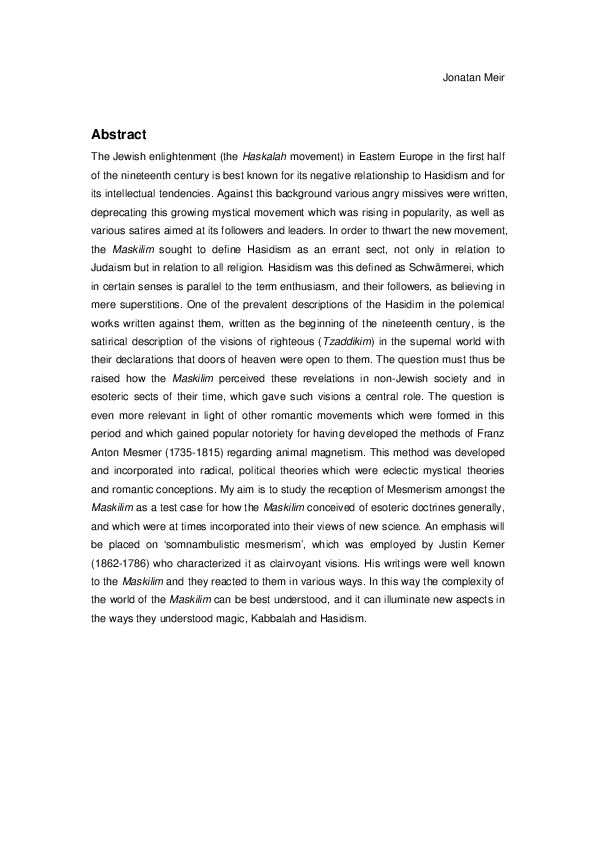Academia.edu no longer supports Internet Explorer.
To browse Academia.edu and the wider internet faster and more securely, please take a few seconds to upgrade your browser.
The Jewish Enlightenment and Mesmerism (GIF Young, 2013-2014)
The Jewish Enlightenment and Mesmerism (GIF Young, 2013-2014)
Related Papers
Already at the beginning of the 20th century several prominent neo-Hasidic writers confessed that nostalgia for the attractions and charms of Hasidism in their writing did not reflect any honest attempt on their part to adhere to the religious beliefs of true Hasidim. Modern literary use of the charms and treasures of Hasidic tradition was now meant to serve the purpose of constructing a secular Jewish identity, or at least one which could serve as a distinct alternative to rabbinic notions of Jewish identity and tradition. Secular modern writers and thinkers promoted an amended version of Hasidism precisely because they hoped to rely upon it as leverage for legitimizing their newfound resentment of Halakha, of the rabbis and of the practice of basing Jewish attachment on philosophical and dogmatic properties of the old classical theology. The next generation of Jewish writers – operating in the following decades of the 20th century from a modern and secular vantage point - features a long line of literary attempts to cling to the unique heritage of Hasidism and reformulate it, not only by abandoning pretensions of ‘returning to the religious fold’, but also by attempting to ground and justify the spiritual distance felt by both the writers and their new readership from Rabbinic and Orthodox Judaism. However, these writers also exhibit attempts to blur and dull the sense of a chasm dividing between their secular and humanist sensibility and an authentic atmosphere of ‘Jewish spirituality’. Such attempts deliberately make life difficult for anyone who would propose to draw a clear distinction between the religious longing manifest in genuine Hasidic writing and its secular parallel. Drawing such distinctions becomes even more complicated when we attempt to compare such literary phenomena with contemporary tendencies in American Jewry that speak of ‘Jewish Renewal’ via open and uninhibited return to Jewish mystical and Hasidic sources. On the one hand, such tendencies do not signify a simple ‘return’ to the original fold of the Hasidic movement. On the other hand, they should also not be taken merely as limited expression of superficial nostalgia for the traditional past. Rather, they represent an attempt to found a new, modern Jewish identity, aided and abetted by Hasidic precedent. Moreover, even the specific ’renovations’ or stereotypes through which Hasidism is currently portrayed appear very familiar to anyone who has already witnessed them in the writings of neo-Hasidic secular writers at the beginning of the 20th century. Despite these similarities, I wish to point to a basic difference between recent attempts to revive the Hasidic heritage as a tool or source of inspiration for religious worship, and prior secular attempts to enlist Hasidism for the purposes of constructing a modern Jewish identity that stands in clear opposition to rabbinical Judaism, challenging the assumption that Jewish identity mandates maintaining specific theological positions or dogmas.
Littman Library of Jewish Civilization
Rapoport-Albert, Ada, ed. Hasidism Reappraised. Oxford: Littman Library of Jewish Civilization, 1996.1996 •
This is an historiographic essay covering the last 30 years of secular historical research on the emergence and early growth of the Hasidic movement among European Jews For those of you who have bookmarked, there is a session open for comment here: https://www.academia.edu/s/6c75c983d6/histories-of-hasidism-the-last-three-decades-in-research
Studying Hasidism: Sources, Methods, Perspectives
Studying Hasidism: Sources, Methods, Perspectives, ed. Marcin Wodziński (Rutgers University Press, 2019)2019 •
Hasidism, a Jewish religious movement that originated in Poland in the eighteenth century, today counts over 700,000 adherents, primarily in the U.S., Israel, and the UK. Popular and scholarly interest in Hasidic Judaism and Hasidic Jews is growing, but there is no textbook dedicated to research methods in the field, nor sources for the history of Hasidism have been properly recognized. Studying Hasidism, edited by Marcin Wodziński, an internationally recognized historian of Hasidism, aims to remedy this gap. The work’s thirteen chapters each draws upon a set of different sources, many of them previously untapped, including folklore, music, big data, and material culture to demonstrate what is still to be achieved in the study of Hasidism. Ultimately, this textbook presents research methods that can decentralize the role community leaders play in the current literature and reclaim the everyday lives of Hasidic Jews.
RELATED PAPERS
University of the People
The Impact of Saudi Arabia's Free Education System and Allowance Programs on Access to Education, Equity, and Student Learning Outcomes2024 •
Impossíveis ou desinteressantes? As teorias essencialistas e a natureza do direito
(Penúltima versão) Impossíveis ou desinteressantes? As teorias essencialistas e a natureza do direito2023 •
Conservation science in cultural heritage
Why the courtyards of historical palaces should nor be roofed in2023 •
arXiv (Cornell University)
Mathematical analysis of long-time behavior of magnetized fluid instabilities with shear flow2017 •
From Insights to Action: AI-Powered Analytics in MIS
Management Information Systems Using Artificial Intelligence2024 •
2024 •
2022 •
2019 •
Journal of Parenteral and Enteral Nutrition
Changes in Body Weight and Body Protein with Intravenous Nutrition1979 •

 Jonatan Meir
Jonatan Meir